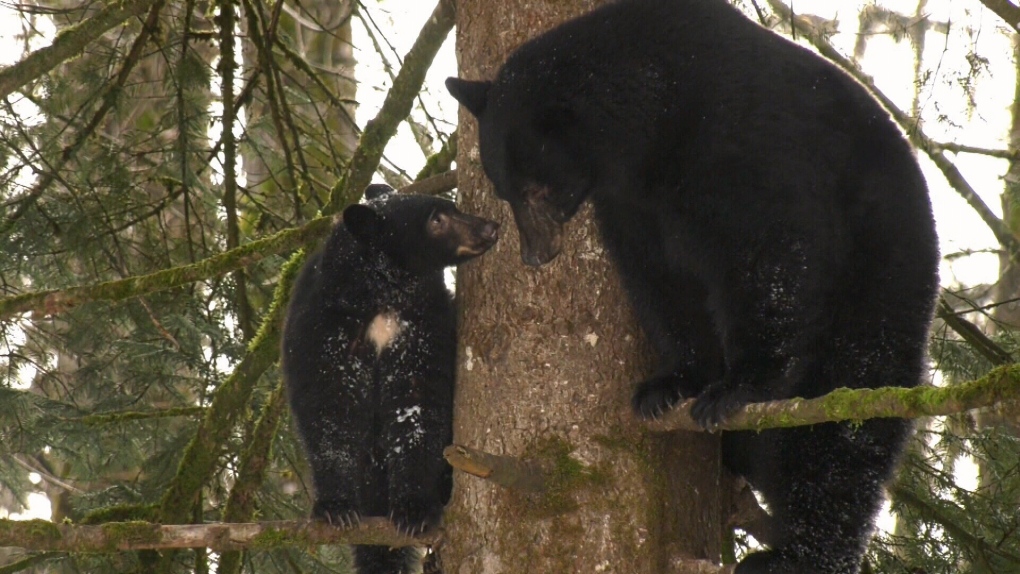Bear and 2 cubs euthanized after repeat sightings in Nanaimo: BCCOS
 A mother bear and her two cubs have been spotted living in a hollowed-out tree and playing among its high branches on Vancouver Island: Jan. 17, 2020 (CTV News)
A mother bear and her two cubs have been spotted living in a hollowed-out tree and playing among its high branches on Vancouver Island: Jan. 17, 2020 (CTV News)
The B.C. Conservation Officer Service (BCCOS) says an adult black bear and two cubs were euthanized after they were encountered several times in the Nanaimo area.
On Saturday, Nanaimo RCMP warned residents to keep their pets inside as police and conservation officers searched the Nanaimo Regional Genera Hospital area for a mother bear and her two cubs.
The warning came after two other reported sightings of an adult black bear with two cubs were made in the city over the past month.
On Saturday, police said that the bear and cubs had been tranquilized and that they would be relocated elsewhere.
On Monday, however, the BCCOS said the trio had been euthanized because they'd become habituated to eating garbage.
'FOOD CONDITIONED'
Conservation officer Sgt. Stuart Bates told CTV News that the service had a long history with the trio, and that they were looked over by a wildlife veterinarian before they were put down.
The vet found that each of the bears had paper towels and tinfoil inside of their digestive tracts before they were euthanized, according to Bates.
In B.C., problem black bears are generally euthanized and not relocated.
In 2021, more than 500 black bears were euthanized while just 19 were "translocated" – though it's unclear if that term includes all bears that are moved, or only bears that are moved at least one region over.
In 2021, 77 black bear cubs were put down, according to an animal rights organization that calls the practice of euthanizing cubs potentially unnecessary.
Earlier this month, the BCCOS urged Nanaimo residents to keep their garbage cans inside or locked up tight due to a rise in bear encounters in the community.
"I can’t stress it enough, if you don’t secure your garbage, you’re going to get a bear killed," Bates told CTV News on May 3.
"Once bears get addicted to garbage, they become what we call 'food conditioned' and while they are doing that, they are in the presence of people," he said. "They lose their fear of people and there’s only one outcome for a bear that reaches that level."
With files from CTV News Vancouver's Ian Holliday.
CTVNews.ca Top Stories

Trump on Day 1: Begin deportation push, pardon Jan. 6 rioters and make his criminal cases vanish
Donald Trump has said he wouldn’t be a dictator — 'except for Day 1.' According to his own statements, he's got a lot to do on that first day in the White House.
King Charles III and Kate attend remembrance events as both slowly return to duty
King Charles III led the nation Sunday in a two-minute silence in remembrance of fallen service personnel in central London as the Princess of Wales looked on, a further sign the royal family is slowly returning to normal at the end of a year in which two of the most popular royals were sidelined by cancer.
Watch as Hurricane Rafael wind topples stadium lights
The outfield lights at a baseball stadium in Cuba proved to be little match for Hurricane Rafael’s extreme wind.
Mysterious black balls that washed up on Sydney beach were foul-smelling mini 'fatbergs'
The black balls – initially thought to be made of tar – were actually mini "fatbergs," made up of human feces, methamphetamine, human hair, fatty acids, and food waste, among hundreds of other vile and befuddling substances.
6.8 magnitude earthquake shakes Cuba after hurricanes and blackouts
A 6.8 magnitude earthquake shook eastern Cuba on Sunday, after weeks of hurricanes and blackouts that have left many on the island reeling.
Sinclair family shares heartfelt message ahead of memorial service
Murray Sinclair’s family members say the late justice and senator has been laid to rest according to his wishes.
Cornwall, Ont. prepares for potential influx of asylum seekers following U.S. election
As the possibility of mass deportations looms following Donald Trump's re-election on Tuesday, border towns like the City of Cornwall are preparing for a potential influx of asylum seekers.
Newfoundland man electrocuted by downed power line, two women injured
Police in Newfoundland say a man was electrocuted Saturday by a downed power wire about 10 kilometres north of St. John's, N.L.
Porsche recalls 300+ Canadian cars at risk of losing wheels
Select Porsche owners in Canada have been told to stop driving their cars immediately and to seek repairs after an issue was identified that could cause wheels to separate from vehicles.






























